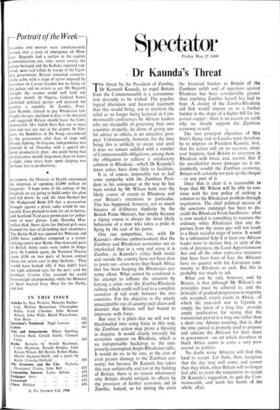Dr Kaunc14's Threat
Pr HE threat by the President of Zambia, I Dr Kenneth Kaunda, to expel Britain from the Commonwealth is a consumma- tion devoutly to be wished. The psycho- logical .liberation and financial easement that this would bring, not to mention the relief at no longer being lectured at Com- monwealth conferences by African leaders who are incapable of governing their own countries properly, let alone of giving use- ful advice to others, is an attractive pros- pect. Unfortunately, however, for the time being this is unlikely to occur, and until it does we remain saddled with a number of Commonwealth obligations, among them the obligation to achieve a satisfactory solution in Rhodesia—which Dr Kaunda's latest antics have done little to facilitate.
It is, of course, impossible not to feel' some sympathy with the Zambian Presi- dent in his annoyance at the way he has been misled by Mr Wilson both over the likely course of events in Rhodesia and over Britain's intentions in particular. This has happened, however, not so much because of deliberate duplicity by the British Prime Minister, but simply because a zigzag course is always the most likely behaviour of a man who takes a pride in flying by the seat of his pants.
One can sympathise, too, with Dr Kaunda's obvious embarrassment that the Zambian and Rhodesian economies are so interlocked that in a very real sense it is Zambia—as Kaunda's critics both inside and outside the country have not been slow to point out—even more than South Africa that has been keeping the Rhodesian eco- nomy afloat. What cannot be condoned is his attempt to inflame the situation by forcing a crisis over the Zambia-Rhodesia railway which could well lead to a complete cessation of rail trade between the two countries. For his objective is the utterly unacceptable one of causing such chaos and disorder that Britain will feel bound to intervene with force.
But once it is plain that we will not be blackmailed into using force in this way, the Zambian action may prove a blessing in disguise. It would clearly intensify the economic squeeze on Rhodesia, which is an indispensable backdrop to the tem- porarily-interrupted Anglo-Rhodesian talks. It would do so, to be sure, at the cost of even greater damage to the Zambian eco- nomy; but because Dr Kaunda has taken this step unilaterally and not at the bidding of Britain, there is no reason whatsoever why Britain should mitigate its effects by the provision of further economic aid to Zambia. Indeed, so far during the crisis the financial burden to Britain of the Zambian airlift and of sanctions against Rhodesia has been considerably greater than anything Zambia herself has had to bear. A closing of the Zambia-Rhodesia rail link would impose on us a further burden in the shape of a higher bill for im- ported copper: there is no reason on earth why we should support the Zambian economy as well. The two principal objectives of Mrs Hart's flying visit to Lusaka must therefore be to impress on President Kaunda, first, that his action will on no account, what- ever happens, lead Britain to intervene in Rhodesia with force; and, second, that if his uncalled-for move damages (as it un- doubtedly would) the Zambian economy, Britain will certainly not pick up the cheque —or any part of it.
Once that is clear it is reasonable to hope that Mr Wilson will be able to con- tinue with his new policy of seeking a solution to the Rhodesian problem through negotiation. The chief political success of the sanctions campaign has been to dis- credit the Rhodesia Front hardliners : what is now needed is something to reassure the ordinary white Rhodesian that any de- parture from the status quo will not result in a black racialist reign of terror. It would be a substantial help if at least one African leader were to declare that, in spite of the evils of detention, the Land Apportionment Act and all the other repressive measures that have been born of fear, the Africans have no quarrel with the European com- munity in Rhodesia as such. But this is probably too much to ask.
What can be said, however, and by Britain, is that although Mr Wilson's six principles must be adhered to, and the principle of gradual progression to majority rule accepted, recent events in Africa—of which the near-civil war in Uganda is simply the latest of a long line—provide ample justification for seeing that the transitional period is a long one rather than a short one. Always assuring, that is, that the time gained is properly used to prepare and educate the Africans for their share in government—an art which elsewhere in black Africa seems to come a very poor second to politics.
No doubt many Africans will find this hard to accept. Let them, then, recognise that the day may well come, and sooner than they think, when Britain will no longer feel able to resist the temptation to accept Dr Kaunda's suggestion, to quit the Com- monwealth, and wash her hands of the whole affair.


































 Previous page
Previous page